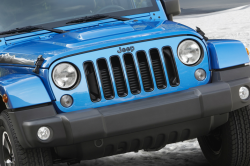— Chrysler has prevailed in a lawsuit that alleges defects in a 2013 Jeep Wrangler caused the death of Arthur Melton Smith in 2013.
Mr. Smith was driving his 2013 Jeep Wrangler in Texas when he veered off the road, traveled 170 feet and hit a concrete bridge pillar.
Chrysler mailed out a recall notice days later about a transmission oil cooler tube that may leak on 2012-2013 Jeep Wranglers. According to the recall notice, the leak could cause a fire under the body of the Wrangler.
The lawsuit was filed by Mr. Smith's wife and three children who claimed the recall defect caused the Jeep Wrangler to catch fire, but Chrysler escaped the lawsuit when a district court ruled in favor of the automaker on all claims. The plaintiffs appealed to the Fifth Circuit which upheld the district court ruling.
According to court documents, the transmission oil cooler tube was placed close to the power steering fluid return tube, allegedly creating a risk the tubes would make contact, tear holes in the transmission tube and cause a leak.
Mr. Smith's Jeep Wrangler was never inspected for signs of a defect before the crash and the Jeep wasn't saved so experts could inspect the vehicle after the crash. However, the plaintiffs claim they returned to the scene of the crash and took photos of what appears to be charred grass along the path of the Wrangler once it left the road.
According to the lawsuit, an autopsy showed Mr. Smith had a carbon monoxide level of 18 percent, something the plaintiffs claim proves a fire was burning before the Jeep crashed. The plaintiffs allege the carbon monoxide poisoned Smith and caused him to pass out and crash the Jeep.
The plaintiffs simply couldn't prove the defect associated with the recall was the cause of a fire, and even the fire expert called by the plaintiffs said he couldn't determine if the fire was caused by the transmission oil cooler.
According to court documents, the plaintiffs realized how weak their case was, so they filed a motion for Chrysler to produce documents relating to other fires in Jeep Wranglers.
Chrysler released 10 years of documents related to other Jeep fires caused by defects other than the transmission oil cooler tube defect. Shortly afterward, the expert fire witness called by the plaintiffs submitted a supplemental report that claimed the fire could have been caused by the defect.
The magistrate judge recommended striking the supplemental report and granting summary judgment to Chrysler, ruling “the additional discovery provided by Chrysler about other vehicle defects does not explain why Schulz [the fire expert] should be allowed to reverse his opinion that there is sufficient evidence for him to have an opinion about this defect.”
The district court followed the magistrate recommendations and entered summary judgement for Chrysler, with the district court adding the expert's new findings "are highly conclusory.”
The appeal to the Fifth Circuit didn't fare any better than the district court's ruling as Chrysler provided solid evidence the automaker placed an interim fix to cure the recall defect on all Jeep Wranglers produced after August 22, 2012. However, Mr. Smith’s Jeep was produced on September 5, 2012.
The appeals court also found the arguments made by the plaintiffs were nothing more than circumstantial evidence not sufficient enough to show the recall defect caused the fire that caused the wreck that caused Mr. Smith's death.
In addition, using the 18 percent carbon monoxide level to show proof of a fire wasn't convincing because Mr Smith was a habitual smoker.
The Fifth Circuit also found the lack of testimony from a fire expert was critical, "particularly here where there was no evidence that this alleged defect had caused a fire in any other Jeep."
"Here, the plaintiffs were required to produce evidence that a defect in the Jeep’s transmission oil cooler caused a leak that caused transmission fluid to come in contact with an ignition source that caused the fire. The plaintiffs have been unable to produce such expert testimony."
In addition to prevailing on appeal, Chrysler also submitted a bill of costs requesting $52,372.88, but the plaintiffs objected by claiming Chrysler didn't need the money.
The district court overruled most of the objections made by the plaintiffs but granted their objection to Chrysler’s request to recover costs for both paper transcripts and video recordings of the same deposition. Then the court awarded Chrysler costs in the amount of $29,412.29.
The case is Smith v. Chrysler Group, L.L.C.

